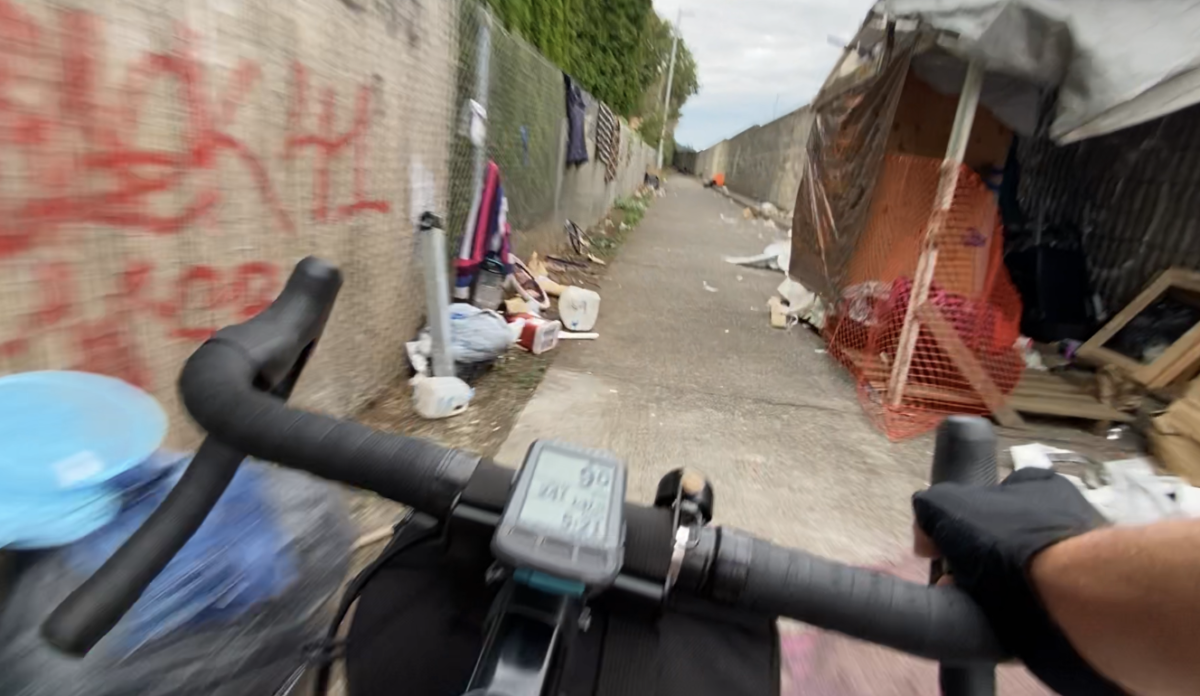
(Photo: Jonathan Maus/BikePortland)
We’ve discussed the issue of Portlanders living outside along popular bike paths many times over the years. But for some reason I’ve yet to share anything about the city’s Homelessness and Urban Camping Impact Reduction Program (HUCIRP). This is the City of Portland program that’s, “responsible for coordinating cleanup/abatement of unsanctioned campsites on City and ODOT owned properties/rights-of-way.”
Earlier today I came across a tweet that highlights current sites HUCIRP crews are scheduled to address. As I looked through the locations I was surprised at how many were on major bike routes and paths.
The 80 or so sites on the current list include many locations you might have ridden by. They include:
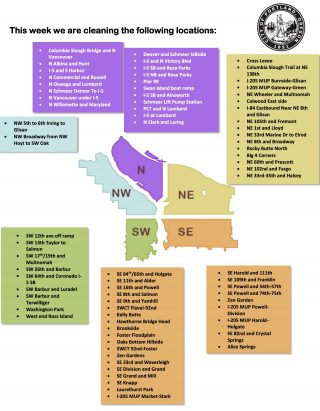
- Columbia Slough Bridge and N Vancouver
- N Schmeer Denver To I-5
- Denver and Schmeer hillside
- I-5 SB and Rosa Parks
- I-5 NB and Rosa Parks
- Peninsula Crossing Trail and N Lombard
- Columbia Slough Trail at NE 138th
- I-205 MUP [mulit-use path] Burnside to Glisan
- I-205 MUP Gateway Green
- NE Wheeler and Multnomah
- NE 33rd Marine Dr to Elrod
- Hawthorne Bridge Head
- Foster Floodplain
- Oaks Bottom Hillside
- Springwater Corridor Trail 92nd to Foster
- Laurelhurst Park
- I-205 MUP Market to Stark
- I-205 MUP Powell to Division
- I-205 MUP Harold to Holgate
Advertisement
Several of these locations are particularly notable to bicycle riders.
At Gateway Green, a major new addition to the bike park is scheduled to open sometime this month. Back in 2016 we shared how people lived on the parcel Gateway Green parcel before it was redeveloped into a park.
Earlier this year people used neighborhood associations as a conduit to voice concerns about campers living on the Peninsula Crossing Trail near Lombard.
I’ve heard from several readers about dozens of RVs and other vehicles housing people along NE 33rd en route to Marine Drive.
And of course we’ve covered conditions on the I-205 several times in the past.
This is such a difficult issue. Paths and bike routes are appealing to those of us who ride bikes for the same reasons as those of us who live outside: they are usually flat, relatively quiet, far from prying eyes, and in more wide-open areas. But as Commissioner-elect Mingus Mapps shared with me this week, “Camping on the bike trail is not good for anybody,” because it can lead to dangerous interactions, makes some bicycle riders afraid, and it means some Portlanders are living outside without access to the comforts and conveniences many of us take for granted.
For more on how the City of Portland manages camps, check out the HUCIRP website.
— Jonathan Maus: (503) 706-8804, @jonathan_maus on Twitter and jonathan@bikeportland.org
— Get our headlines delivered to your inbox.
— Support this independent community media outlet with a one-time contribution or monthly subscription.



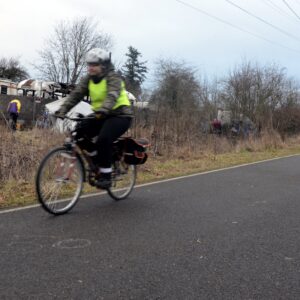
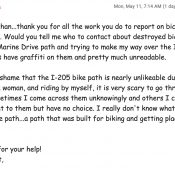

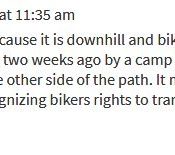
Thanks for reading.
BikePortland has served this community with independent community journalism since 2005. We rely on subscriptions from readers like you to survive. Your financial support is vital in keeping this valuable resource alive and well.
Please subscribe today to strengthen and expand our work.
Great to see some work being done. Thanks for this article. I’ll look forward to seeing the results!
So aside from all the controversies listed elsewhere, where is the enforcement piece in all this, to keep paths clear of debris, threatening behavior, and bad characters? Are we going to have to keep clearing the paths on a weekly or daily basis?
David, We don’t do enforcement in Portland anymore. It might have a negative impact on someone who is not of the privileged class.
***Comment deleted. Steve, please try to make your point without being insensitive to other people. Thanks – Jonathan***
***Comment deleted by request of author.***
I for one appreciate that JM does a very good job overall moderating this news blog. I certainly get a lot out of it. I also very much appreciate the editing tools, including the ability for me to edit any of my own remarks that I might later regret making, as long as I catch myself within a half-hour of making the error or poor judgement. I also appreciate JM’s willingness to remove earlier remarks if requested by the authors. But such removals do often screw up subsequent threads, so I would encourage repeat offenders to re-read their comments once or twice immediately after posting them, to save the rest of us the angst of seeming to reply to nothing later on.
I’m happy to hear about the cleanup. I’m surprised that the I-205 MUP from Market to Division isn’t included. That stretch has the underpass and green on the north side of Division, both of which have been problematic.
***Comment deleted by request of author.***
I am not supportive of sweeping people living along or near the path during the pandemic. HOWEVER THE CURRENT PROBLEM IS THAT PEOPLE ARE CAMPING AND PILING GARBAGE DIRECTLY ON THE PATH. There has to be a compromise where we can agree that the paved portion of the path is for travel and not for tents or garbage.
This is a typical Portland response. We have two different problems that need different solutions. Letting people camp (and do drugs!) on the paths does NOTHING other than convert one issue into two. Get people who need shelter some shelter. There are many places that are VACANT that could be used. What are the taxes passed last year being used for?
PS – I said “doing drugs” as the area in the picture (I-205 path & Burnside) was always a shooting gallery until I stopped riding that path 2-3 years ago. Too scary for me.
Do you happen to live anywhere near any of these paths? I’m sorry my comment came across as anti-houseless, I believe these folks have the right to services. I am however, firmly anti-litter, human waste, used syringes, and stolen property.
You are welcome to spend your money and time to address this, but I am not paying for poor choices. I camp all the time, but I do not litter. Our society has CHOSEN to ignore mental health. Don’t pontificate to those who get up and work everyday. Maybe there are simply too many people. They have no right to build “shelters” on the sidewalks and streets. Sick of it!
“I camp all the time, but I do not litter”
What do you do with the rubbish you produce?
Does it involve a service that removes it from where you are and puts it somewhere else?
“Maybe there are simply too many people” Sounds like you might have a solution in mind, possibly of the sort favored by business organizations in Rio.
Care to tell us about it?
When I camp, I carry my trash (and often that of previous campers) to a disposal bin somewhere. Sometimes this means hauling it many miles, sometimes over difficult terrain, until I find a place where it can be properly disposed of. It would be far more convenient to just leave it behind, but that would be disrespectful to others. If I pack it in, I pack it out. It’s really not that complicated; not leaving a mess is just one of many duties we all have in a crowded world.
When people get swept, where are they supposed to go? It seems to me that for the foreseeable future there will be people camping in Portland. I wonder why we can’t establish a campground that has showers and bathrooms and some tent platforms. The goal ultimately should be decent housing but in the near term, this would be better than sleeping on sidewalks with no bathrooms nearby.
I agree with this 100%. I understand that it’s complicated, but the compassion I’ve had has eroded with more and more and more garbage, serious safety issues sending my kids alone to parks, on paths, etc. I do think people living outside need to be encouraged/pressured to move to more established and managed camps with services and facilities. This would be a halfway measure and what I would like to see our tax funding spent on.
***Comment deleted by request of author.***
I don’t want compromise, I want it all: clean, safe bikeways and people living in permanent housing or shelters. These two goals are not in any way oppositional.
Where I see a greater potential conflict is getting folks into shelter when they really just want to get high, or getting folks into institutions where they can get the treatment they need. If we need money, raise taxes. I’ll pay.
Finally, it is much easier to say “I have compassion” when your bike isn’t being stolen, your yard isn’t being used a a toilet, and your kids aren’t finding needles on the playground. So it does ring a little hollow when the person telling those who deal with this stuff to “have a bigger heart” is not themselves in the thick of it.
These were build to be transportation and recreation paths, not homeless camping grounds. What we would do if these same people decided that the place they were going to camp was on MAX? Would we just let them? Why do they get to have priority use of something that was never intended for that purpose? As a user, not a camper on the paths, I don’t leave my trash behind or create obstructions for other users of the path. I understand they need somewhere to be, but why does it have to be somewhere that was not designed for them.
Thumbs down. We can’t just give everything up because someone decides to squat there and call it home. And based on my own personal experiences on the path I can’t really feel sorry for everybody out there either. Yeah some folks deserve help. Some deserve absolutely nothing.
Yes, a very fine line between helping those who want the help to get themselves into a better situation & enabling those who are quite content where/how they are. Sadly the latter are often quite good at camouflaging themselves as the former.
Just wondering what your line is for the level of behaviors we should tolerate. Would you have the same stance if weather and COVID were not considerations?
Hi Matt, which homeless camp do you live right next to? The folks who live next to the peninsula crossing trail daily have to deal with broken needles on the ground, gunshots, and folks driving their cars up and down the path at all hours of the night.
Has that been your experience with the camp you live right next to?
Verbal assaults, threats of physical harm, threatening to burn your home down for simply asking them to stop dangerous, destructive activities near a yard where children are playing. Yes, these things and more have happened to people I know who live near the 205 path. Oh they are very fond of their so-called “neighbors”.
My understanding of the “clean-ups” (as opposed to “removals”) is that they only address trash and biohazards at the time they get to the camps. While the clean-ups make things a little more tolerable, the results are very short-lived. I don’t see any change happening until the city opens enough shelters that everyone on the street can be placed in a shelter.
The city of Gresham (from my personal knowledge) and perhaps other jurisdictions outside of Portland don’t tolerate homelessness in public spaces and can enforce the city rules because they provide everyone out on the street a spot in an shelter. As you can imagine, some folks on the street don’t want to live in a shelter. So, they seem to move into Portland jurisdiction where there’s not enough shelters and therefore no requirement to leave.
Agreed. Unfortunately Portland is enabling the homeless/houseless population. Many homeless (not all but many) come from all over the country to Portland because there is no expectation of personal responsibility. One can camp wherever, whenever with no limitations. One can leave garbage, drug needles and excrement wherever one feels like it. Why live in Gresham where you have to enter a shelter when you can come to Portland do whatever you want, get free handouts and have the city provide you with trash service? We should do what Gresham does– OUTLAW camping and provide shelter beds.
https://katu.com/news/local/gresham-sees-success-with-its-efforts-to-help-the-homeless
I rode over the 205 bridge yesterday, the tunnel north of killingsworth under the train bridge is worse than I have ever seen it. The path is narrowed to under 2 feet in places by piles of garbage including bike parts. Some people milling around, I was somewhat worried that I was going to be mugged. There is not a particularly great or safe way to go around this important connection, but I went a different less safe from cars way on the way back. Camping adjacent to the path is not great, piling stuff up on the path preventing people from riding on it has to stop now.
Can we build more public/subsidized housing already? How is it morally acceptable to have so many people unhoused?
Sure we can. Do we want to pay for it? And just WHO pays for it?
Yes! Let’s do it!
You may recall that Portland has the motto “the city that works,” but in my book we have lost claim to that title. I think our new motto should be “the city with good intentions.” There has been a lot of talk about housing, but I’m not aware of any substantial progress being made.
I like it, but propose a slight modification: “The city that plans to have good intentions.”
“but needs consensus first”
The City That Protests
“The city that’s bursting with pride at the good intentions that will potentially happen after meetings and conversations lead to a watered down result”
I’d love to see a contest for creating Portland’s new motto!
The City can give the winner a coveted Spirit of Portland award.
Yeah, signed by Chloe Eudaly.
I think the plan is to open many more sanctioned, organized, supervised camps like the C3PO camps in the CEID, where campers can live in safety with basic services, initially in tents but later in tiny houses. I don’t understand why it is taking so long. Hasn’t it been apparent since spring what the pandemic / depression was going to mean?
I’ve heard that some businesses downtown are so desperate to get the tent cities off sidewalks that they are offering up vacant lots, empty parking garages, even unused buildings for temporary shelters. Downtown is hanging on by a thread.
For winter shelters, there is the 1 million sq ft at the Convention Center and the 700,000 sq ft at the EXPO center, vacant, publicly owned, and not being used. The coronavirus shelters in the former were even shut down over the summer.
My recollection is that the city and country spend around $100 million per year on homeless services. For that sum, doesn’t it seem like we should be able to at least provide safe camps?
It feels to me like ordinary people are being set at each other – campers vs cyclists vs neighborhoods vs businesses – because our government can’t do its job.
My hope is that city council will step it up in this time of crisis. I appreciated the detailed interview with Commr-Elect Mapps, and hopefully the other commissioners and commissioners-elect will spend some quality Zoom time with BP too.
The anger is less about houseless people camping and more about local government’s inability or flat out refusal to do anything about it. Parking garages and empty or under utilzed publically owned buildings are a great resource not being used during this crisis. I’ll say it, mock me if you wish, but Portland is ripe for populist politicians offering a “Make Portland Clean Again” message. I’d rather the city and county do something with dignity and humanity very soon before the voters start electing people that will unleash the cops on houseless folks, perform violent sweeps, destroy people’s possessions, and put them on busses to elsewhere to “solve” the problem.
We totally need some riots about this.
I rode the 205 path between the Springwater and Gateway last week and found it much improved. I crossed paths with some Parks workers cleaning up landscaping, and a Central City Concern vehicle with multiple workers picking up trash, and likely providing other services. The scores of campsites that I passed were pulled back out of the way and the path was passable.
Tweet link goes to an old BP article.
Doh! sorry about that. Should have gone here – https://twitter.com/abolishICE___/status/1326256421416022016
Solutions to the housing dilemma need to be multi tiered: 1) Sanctioned camping with supervised drug use and access to hygiene services and social workers. 2) Transitional housing with full rap around services for rehabilitation. 3) Government subsidized housing for clean and sober — people are actively working and moving forward. 4) Affordable housing for fully independent and recovered folk.
This.
Matt S., you’ve got my vote. It’s so frustrating for us to not hear why this isn’t happening. Or is it? I don’t know because our City leaders seem to have lost their way when it comes to communicating with us. What is happening? Why aren’t these things happening? What’s the plan?
Agreed, and add to that no structures on sidewalks, no unlicensed/unregistered/unsafe vehicles, no structures in park or along the river, no drinking or drug use in parks or at any transit facility.
Why no drinking in parks? I struggle with this one. Why can’t I have a beer while grilling my veggie burgers at the picnic area at Tabor? Let’s allow responsible adults to be responsible adults.
It is a local law that the city of Portland could relax. You can drink in parks in Albany for example.
I agree with you, actually. That makes sense. I was thinking of the piles of cans, so maybe trying to enforce no littering, but that seems like folly.
AMEN
Oh man, Matt. Frankly those services you are offering look like a lot of fun. I wouldn’t mind camping and doing supervised drugs…and how long does the affordable housing last?
Take away the fear of hunger and cold, and I’m not going to work every day.
You’ll live a life of suffering. My suggestions aren’t new and they are a pathway out of suffering. Any habitual heroin user isn’t using because it’s fun.
Having not yet read the 34 messages already posted, I would just like to observe how refreshing it is to hear Mingus Mapps say, unequivocally, “Camping on trails is bad,” instead of the lectures we got from Chloe every time the issue came up.
So happy the voters voted Mingus in and Chloe out.
Let’s not forget Sarah’s pronouncement that it is time to “cede” the MUPs to camping.
We really avoided a catastrophe with her.
Some politicians just engage in “compassion shaming” but offer no other viable solutions other than to say “check your privilege”.
I’m a former Portlander who lives in Vancouver Wa. now. Lately I am appalled at site of garbage-strewn campsites when I come into Portland. It no longer feels like the safe, livable city I spent most of my life in. I never thought I would feel afraid to ride my bike in Portland. This has everything to do with the city itself systematically sticking its head in the sand. Houseless people deserve healthy living conditions. Step up, Portland.
So where are all of Vancouver’s houseless people? Did the ‘couve help them out & solve the houseless issue there? Or did they just sweep them over the bridges to PDX? I think a lot of houseless portlanders used to live somewhere else. This problem needs help and funding on a regional and a federal level so that cities aren’t overwhelmed with the costs of the solutions.
Sometimes I feel like Portland taxpayers are getting stuck taking care of the whole region’s homeless. I guess if I was homeless I would move here too. No personal responsibility required and lots of free services. What’s not to love? Camping anywhere, anytime. Free shower trucks. Lots of free food, And you can throw your trash and excrement anywhere you want. Even better the silly people who work everyday use their tax dollars to pay someone to come clean it up for you. It’s sweet.
Doesn’t happen in Washougal or Pineville. Oh, but the bikes paths for the residents are much better in Portland.
At least as long as you don’t fall and impale yourself on a discarded hypodermic needle. But I digress…..
To add insult to injury anybody who complains about the problem is quickly shouted down and accused of lacking compassion. Remember that Wheeler and his homeless-industrial complex cronies extract federal money for a lot of this mess, so why would they want it to go away? They can all afford to shield themselves from the mess and live in greener pastures.
I’m very glad to see this happening. While we definitely need to address our unhoused community in a compassionate way it’s unacceptable to lose regional bike infrastructure to unregulated camps.
I ride the 205 path from the Columbia to the springwater regularly and it’s gotten really awful in recent months.
I suggest fencing off two lanes on Powell bvld to create secure camps for the unhoused.
What a great idea! And we can divert all that heavy traffic and freight on Powell into the surrounding neighborhoods, thus calming traffic throughout SE Portland.
keep sending locations in to the city’s reporting website!
I am glad that the city is doing something to address these issues. I have been avoiding the Peninsula Crossing Trail and the I-205 MUP for quite a while because of the encampments. Effectively addressing homelessness is not going to be quick, easy or cheap. It will involve the provision of a lot more public/social housing, a lot more social services and an acknowledgement that housing has to come before treatment for chemical dependency.
Some cities have successfully addressed the social problems that cause/exacerbate homelessness, but again it was not cheap, easy or quick. Cities that are willing to partner with not-for-profits and faith based outreach have been successful, but so have cities that didn’t.
I want everyone to have a warm, dry, safe place to lay their head at night. The lack of a social safety net in the USA is one of the principal causes of homelessness, and crying about people being “welfare …” is not helpful.